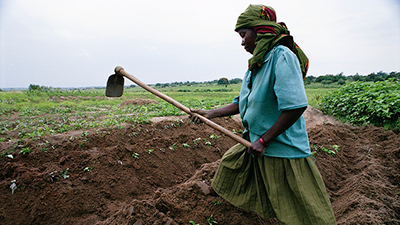A reforestation project on the Plateau of Bateke in the Democratic Republic of Congo will generate important environmental benefits to the local community as well social services through an innovative financing scheme.
By reforesting 4,200 hectares of degraded land, the Ibi Bateke Carbon Sink Plantation Project will trap an estimated 2.4 million tons of carbon dioxide (CO2) over the next 30 years, generating emission reductions that will be sold to finance the expansion of the project as well as health, education and agro-forestry activities in the local community, some 150 kilometers from the capital of Kinshasa.
This is the first project in DRC to benefit from global trade in emission reductions under the Clean Development Mechanism—a market-based approach that allows countries which have ratified the Kyoto Protocol to purchase carbon credits from each other, reducing greenhouse gases in the atmosphere to slow global warming.
The World Bank’s BioCarbon Fund will purchase 500,000 tons of emission reductions (so-called carbon credits) to be generated by the project until 2017 from a private company called NOVACEL, founded and headed by locals from Bateke, including the Mushiete brothers Olivier and Thierry.
The objective of the initiative is to lead the local population and farmers to stop the destruction of the natural forests and to concentrate on planting managed forests, says Olivier Mushiete, director of the Ibi Bateke Carbon Sink Project.
The degraded lands will be transformed into a managed forest of acacia, eucalyptus and indigenous species that will sequester CO2 and contribute to the supply of fuelwood for Kinshasa.
Project Creates a ‘Carbon Sink’
By planting new trees, the project serves as a "carbon sink"—it captures carbon from the atmosphere and stores it in the biomass of the growing trees, thus combating climate change.
"A carbon sink is not just about planting trees," says Mushiete. "It is also about the interaction with local people who work with us and notably about giving value to their natural resources, such as the clay soil in which the trees grow and which, after treatment by our machines, can be used as bricks to build the houses we see here and which shelter the agro-foresters who we work with."
"As DRC starts preparing for a future international mechanism to compensate tropical nations that reduce deforestation and forest degradation (REDD), this project illustrates concretely how carbon finance can support both the environment and generate revenues to local communities," says Marie Françoise Marie-Nelly, World Bank Country Director for DRC, who signed the Emission Reductions Purchase Agreement (ERPA) with NOVACEL at the World Bank office in Kinshasa today.
The Bank’s BioCarbon Fund has had a pivotal role in enabling NOVACEL to obtain loans from private firms (Suez and Umicore) to finance upfront investments. Also, it has attracted the participation of another carbon buyer, Orbeo, a subsidiary of the French conglomerate Société Generale and Rhodia, which is buying a similar amount of credits.
"We are very happy to see how innovative financial instruments, such as the BioCarbon Fund, can facilitate the generation of a revenue stream for a poor community, in the form of carbon credits," says Kathy Sierra, World Bank Vice President of Sustainable Development.
The Ibi Project is also receiving support of the Ministry of Environment of Conservation of Nature. Since DRC ratified the Kyoto Protocol in February 2005, the government has been making an effort to comply with the commitments of the Protocol by supporting projects that will generate carbon credits, especially afforestation and reforestation projects.
"The project at Ibi demonstrates the potential that the CDM has for sustainable development in DRC," says Vincent Kasulu, Director of Sustainable Development at the Ministry of Environment and Nature Conservation. "It also shows the importance of associating private investors to make this kind of initiative happen."
The project is creating a buzz in Africa, according to Thierry Mushiete.
"We want to share our experience with others so that there can be a true spill-over phenomenon," he says.
With this mind, technical capacity building event on monitoring methodologies for carbon projects aimed at project developers of BioCarbon Fund projects in Francophone Africa is scheduled to take place at the Ibi station in November 2009, with the support of the Fund. "I think it is an opportunity for Africa to say, ‘Let’s take a new direction--the environment’," Mushiete says. "We must understand the advantages and the challenges we have to face to be part of a new world."

